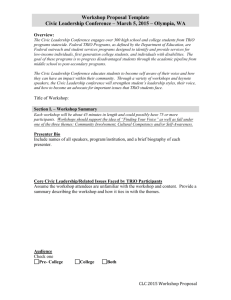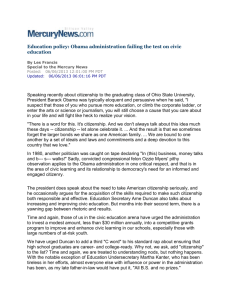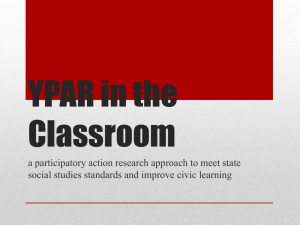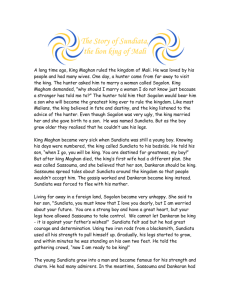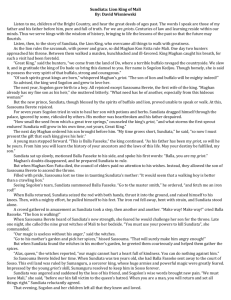sundiata - Flinders University
advertisement
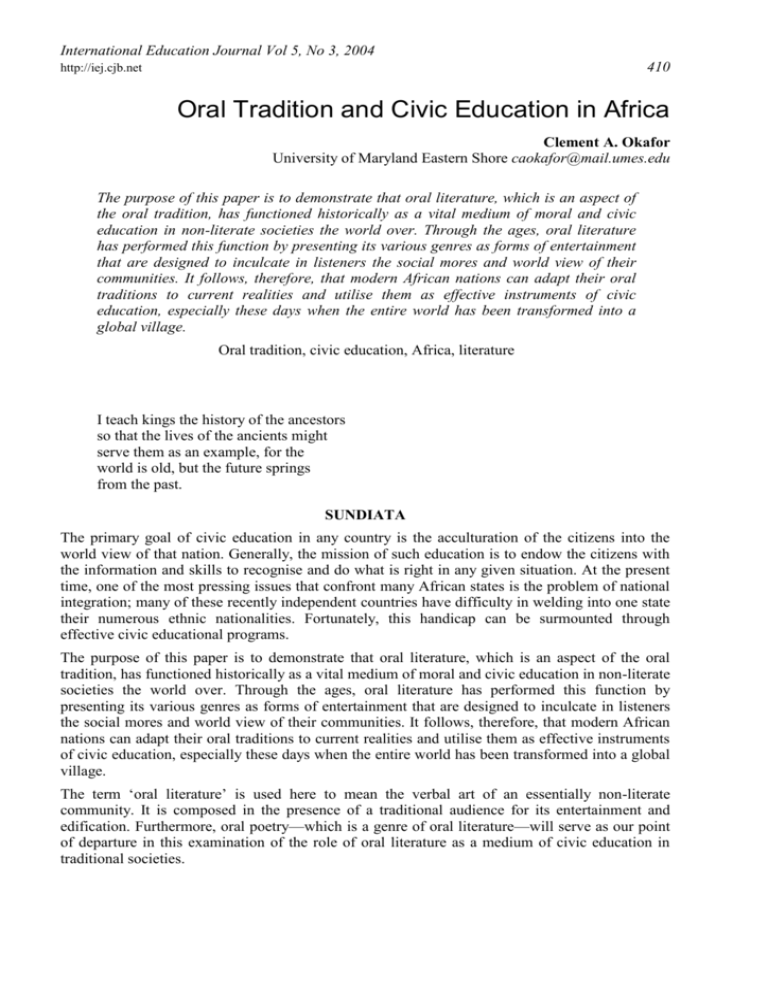
International Education Journal Vol 5, No 3, 2004 410 http://iej.cjb.net Oral Tradition and Civic Education in Africa Clement A. Okafor University of Maryland Eastern Shore caokafor@mail.umes.edu The purpose of this paper is to demonstrate that oral literature, which is an aspect of the oral tradition, has functioned historically as a vital medium of moral and civic education in non-literate societies the world over. Through the ages, oral literature has performed this function by presenting its various genres as forms of entertainment that are designed to inculcate in listeners the social mores and world view of their communities. It follows, therefore, that modern African nations can adapt their oral traditions to current realities and utilise them as effective instruments of civic education, especially these days when the entire world has been transformed into a global village. Oral tradition, civic education, Africa, literature I teach kings the history of the ancestors so that the lives of the ancients might serve them as an example, for the world is old, but the future springs from the past. SUNDIATA The primary goal of civic education in any country is the acculturation of the citizens into the world view of that nation. Generally, the mission of such education is to endow the citizens with the information and skills to recognise and do what is right in any given situation. At the present time, one of the most pressing issues that confront many African states is the problem of national integration; many of these recently independent countries have difficulty in welding into one state their numerous ethnic nationalities. Fortunately, this handicap can be surmounted through effective civic educational programs. The purpose of this paper is to demonstrate that oral literature, which is an aspect of the oral tradition, has functioned historically as a vital medium of moral and civic education in non-literate societies the world over. Through the ages, oral literature has performed this function by presenting its various genres as forms of entertainment that are designed to inculcate in listeners the social mores and world view of their communities. It follows, therefore, that modern African nations can adapt their oral traditions to current realities and utilise them as effective instruments of civic education, especially these days when the entire world has been transformed into a global village. The term ‘oral literature’ is used here to mean the verbal art of an essentially non-literate community. It is composed in the presence of a traditional audience for its entertainment and edification. Furthermore, oral poetry—which is a genre of oral literature—will serve as our point of departure in this examination of the role of oral literature as a medium of civic education in traditional societies. Okafor 411 Homer’s Iliad1, which is one of the pillars of literature of the Western world, is now generally believed to have been composed by an essentially oral poet. This Homeric epic is based on the popular, traditional lore of the time and it portrays the heroic exploits of valiant men. Admittedly, these men have their foibles and personal failings. Yet, in the main, they are portrayed in such a way that they are seen as men who embody the highest ideals of the society. In Homer’s account of the Trojan War, many of the characters indulge in various aspects of Oral Literature, as is exemplified when even in the heat of battle Glaukos regales Diomedes with the panegyric of his ancestors, as may be seen in Book Six of the epic2. It is my contention that the presence of this panegyric here is not accidental. Rather, it is in keeping with traditional practice. Such is the way that traditional composers hold up for emulation the socially admired qualities of their cultural heroes and role models. More importantly, this method of inculcating desirable behaviour is not limited to European traditions. On the contrary, such practices abound in the African continent. Among the Basotho, for example, as Kunene has amply demonstrated, the men who are held up for societal admiration and emulation are “men who are men,” men who would rather lose their lives than lose their honour. On account of the proximity of Sotho life to all kinds of physical danger like the endemic raids that enable one to enlarge one’s herd of cattle, the constant threat of annihilation by hostile, neighbouring ethnic groups, and the abundance within that environment of predatory animals like lions and hyenas, the ethos of Sotho society encourages the admiration of men who are not only courageous but are also physically strong. This attitude is epitomised in the following Sotho poem: The newly initiated on yonder at Mohato’s Is dark-brown-colored and has strong biceps. His thigh is like an antelope’s, he, the Letsitsa warrior, Brother of Mpinane, Indeed were it that men were bought, He should then be surely bought, he, ‘Mamononane.3 The same attitude is also reflected in the following poem: High-ranking ones are they who sit within the king’s court the Dinare Regiment; Beautiful men whose seed is fit to be planted, Dinare, Planted within the valleys to sire Diwehla warriors.4 Not unexpectedly, these Basotho who admire men of courage are totally contemptuous of cowardly men, since such weaklings are a threat to the corporate survival of their nation: On that day there was a separation of men, Yea, the cowards separated themselves, and were seen; And they clawed the mountain-sides; They splashed the mountain with their liquid excrement, The cowards splashed their heels with liquid excrement.5 By celebrating in this manner the lives of the men who epitomise the societal ideal, the Basotho people use these heroic portraits to inspire young men to emulate their valiant ancestors. As is clear from many of the poems in Sotho tradition, these ancestors risked their lives sometimes not 1 Homer. (1975) The Iliad of Homer. Trans. Robert Fitzgerald. New York: Anchor Books. Homer. Op. cit. (pp.141–158). 3 Kunene, D. (1971) Heroic Poetry of the Basotho. Oxford: Oxford University Press. (p.8). 4 Kunene. ibid. 5 Kunene. op. cit. (p.9). 2 412 Oral Tradition and Civic Education in Africa out of necessity but in their quest to bring honour to themselves and their community. Thus, these warriors who are celebrated in these works have demonstrated that there is more to life than mere vegetable existence. Among the Tswana people, also of Southern Africa, praise-songs are again a medium of inculcating societal ideals because, although such poetry may be composed about all conceivable topics, the principal theme of the praise-poems is valour. In this tradition, one is permitted to sing in praise of one’s spectacular achievements. Usually when a man has accomplished spectacular deeds, he composes poems into which he weaves the historical circumstances that surround the events. In this way, the praise-songs also serve as a medium of preserving historical records. Another use of praise-songs in this society is the praise of one’s lineage or ancestry. In this situation, the feats performed by one’s valiant sires are catalogued and the circumstances of their outstanding deeds are also listed. The goal, of course, is to spur on their descendants to try to achieve similar goals in their own lives. This is particularly true of praise-songs of chiefs and their predecessors. Such poems exhort the chiefs to emulate those qualities of their ancestors—like courage in battle and the chase and their generosity in distributing largesse—which made them truly great and enabled them to bring prosperity to their kingdom. Such poems often remind the chief of the most urgent tasks that demand his immediate attention. In very rare instances, however, there may be implied and indirect criticism of his not-so-pleasant deeds. In such situations of negative praise-singing, the poet takes shelter under the poetic licence that is accessible only to court poets. Generally, however, the praise songs may pertain to the spectacular achievements of the reigning king. By implication, he is being urged to continue along the lines that won him the glory, as is exemplified in the following eulogy of Tshekedi, one of the famous Tswana rulers: When the tribes were gathered yonder and all the chiefs went to be shaved, ours did not have his hair cut, Tshekedi it is who stays as he was. A lion that limps is not worthy of a mane, If it’s a coward it’s not worthy of a crest, but an all-powerful one can never be shaved.6 The same feeling is illustrated in yet another extract from the same praise-poem: The lion roared in wonder at Tshekedi, for it saw the chief challenge it, MaMphakere’s and Bonyerille’s brother challenge it. The wind pierced the man’s bones, it pierced the young man’s joints; those born in Serowe were overcome, there remained those born in Palapye; Tshekedi alone did not shiver.7 Among the Nyanga people of Central Africa, the Mwindo Epic is a sustained panegyric of their cultural hero, Mwindo. This enfant terrible—whose birth was previously proscribed by his own father—is born preternaturally through the medium of his mother. He is born with a Conga sceptre in his right hand and an adze in his left. In addition, he is born carrying a bag of the spirit of Kahombo. Above all, Mwindo talks and walks soon after his birth. His exploits are truly heroic because they take him to the four spheres of the Nyanga universe: earth, underworld, atmosphere, 6 7 Schapera, I, ed. (1965) Praise Poems of Tswana Chiefs. Oxford: Oxford University Press. (p.226). Schapera, ibid. Okafor 413 and sky. In each sphere, he battles with titanic forces, some human, some animal, some divine, some semi-divine, while some are utterly fabulous like Mkiti, the Water Serpent. The hero’s tribulations begin soon after his birth; his father tries unsuccessfully to spear him to death. Thereafter, his father imprisons him in a drum and throws both the drum and its content into a pool. From there, the hero begins his underwater journey that takes him to the domain of Mukiti, the Water Serpent. There, he overcomes all kinds of aquatic enemies. At this time, he has become an adult and now Mwindo, the Little-One-just-born-he-walked, returns home to confront his father. The resulting war in their hometown, Tubondo, totally devastates the place, but Mwindo’s father—Shemwindo—escapes to the underground region. This, in turn, necessitates Mwindo’s subterranean journey in pursuit of his fugitive father. In this zone, too, he overwhelms all the forces that offer shelter to his father and eventually captures the old man. On his return home, Mwindo rebuilds his destroyed hometown and is installed as its ruler in the wake of his father’s abdication. Thereafter, he rules peacefully for several years. However, he commits an act of hubris, which results in his being punished. Paradoxically, it is during this period of chastisement in the aerial zone that Mwindo sheds his youthful exuberance and learns moderation, which is the Nyanga ideal of the good life. It is indeed after he has purged himself of all forms of excesses like boasting that he begins to rule wisely. Thus, in the end, Mwindo epitomises moderation, courage, humility, wisdom and benevolence, which together constitute the ideal qualities expected of a great Nyanga ruler. By eulogising Mwindo in this manner, the Nyanga society holds him up as a role model that should be emulated by its citizens. The practice of using praise-poems as a medium for inculcating desirable social behaviour is not limited to Southern and Central Africa. On the contrary, such a system of civic education is practised in West Africa, too, as is exemplified in Sundiata: An Epic of Old Mali. This narrative begins with a categorical statement by the griot as to the function of oral literature in society as well as the role of the oral performer within that tradition: I am a griot. It is I, Djeli Mamoudou Kouyate, son of Bintou Kouyate and Djeli Kedian Kouyate, master of the art of eloquence. Since time immemorial, the Kouyates have been in the service of the Keita princes of Mali; we are vessels of speech, we are the repositories which harbor secrets many centuries old. The art of eloquence has no secrets for us; without us the names of kings would vanish into oblivion, we are the memory of mankind; by the spoken word we bring to life the deeds of kings for younger generations. …………………………………… I teach kings the history of their ancestors so that the lives of the ancients might serve them as an example, for the world is old, but the future springs from the past.8 Thereafter, the griot re-enacts for his audience an account of the heroic life of Sundiata, Emperor of the ancient kingdom of Mali, son of Nare Maghan Djata and Sogolon Djata—the human 8 Niane, D.T. (1970) Sundiata: An Epic of Old Mali. Trans. London: Longman. (p.1). 414 Oral Tradition and Civic Education in Africa incarnation of the fabled Buffalo of Do. Thus, Sundiata’s genealogy shows that he is a fit subject of a heroic narrative even in the classical Western sense of the word; his father is a king, while his mother is partly human and partly animal. Besides, his birth is heralded by portents, much in the same way as the heroes of Western epics. He has retarded and unusual development as a child, but once the lion in him is awakened, he becomes a child endowed with prodigious strength. Since his special talents arouse the jealousy of his father’s other wife, Sassouma, his mother takes him with her into exile. It is noteworthy, here, that the exile of an endangered saviour of his people is recurrent in many traditions the world over. During the seven years of Mwindo’s exile, the hero acquires both wisdom and the art of warfare, which stand him in good stead when he returns home to liberate his fatherland from Soumoro Kante, the sorcerer King of Sosso. In the end, Sundiata’s battles against Soumaoro turn out to be more of a contest of charms rather than one of physical prowess. Predictably, Sundiata triumphs; as his griot, Balla Fsseke, reminds him: Your are the son of Nare Maghan, but you are also the son of your mother Sogolon, the buffalowoman, before whom powerless socerers shrank in fear. You have the strength and majesty of the lion, you have the might of the buffalo.9 Having liberated his homeland, Sundiata extends the war to Soumaoro’s home base and sacks Sosso, to the land of the sorcerer king. Thereafter, Sundiata’s rule is unchallenged throughout the region. Like all such epic heroes, Sundiata finally begins to give laws and prohibitions that do not merely enable him to rule peacefully but also to establish a reign of peace that lasts long after his death. It should be noted that the truly remarkable qualities of the Emperor of Mali are his aristocratic birth, his prodigious strength, his indomitable courage, his patriotism, and his love and concern for the welfare of the citizens of Mali. These are the qualities that both the griot and his community at large admire. They, too, are the qualities that the community would like the audience to emulate from this narrative of the life of the heroic king. It is not only in the sahel region of West Africa, however, that the art of using praise-songs as a medium of inculcating admirable social behaviour is practised. The Ozidi Saga, which is an Ijo epic has a similar objective. The Ijo people are an ethnic group in Nigeria’s Niger Delta region. In this rendering, a group of warrior-lords from Orua, who do not want Temugedege to become their king, assassinate his brother, Ozidi, who is the commanding general of their nation-state. Later, a son is born posthumously to the assassinated warrior. Consequently, even before the boy is born, his grandmother takes Ozidi’s mother (Orea) to her own home in Ododama. In the safety of Oreamae’s home, the pregnant Orea gives birth to her son, named after the infant’s dead father. The upbringing of this child is specially supervised by Oreame. As is common with such epic heroes, Ozidi develops prodigious strength early in life. Later, he returns home to destroy all those who had a hand in the assassination of his father. As is also the case in most traditional societies, such a act of vengeance is what is expected of a dutiful son. Thereafter, Ozidi engages and vanquishes every kind of preternatural force and monster ranging from the Scrotum King to cannibals like Azema and Azemaroti. His final battle is with the Small Pox King. Here, Ozidi is almost vanquished by his assailant, but once Orea treats her son with the antidote for yaws, Ozidi overcomes even this near-fatal attack. In the end, Ozidi’s authority is unchallengeable and he lays down his sword when there is nobody else to fight: 9 Niane, op. cit. (p.63). Okafor 415 Hey, Orea, my mother, my mother, my mother, my mother! Those who killed my father I have now taken them all, my mother, mother, mother, mother! Oh, Oreame, my mother, my mother, my Mother! Oreame, you the woman who knows everything, take my sword, take my sword, take my sword, take my sword!10 Here again, the virtues that are dramatised for emulation are Ozidi’s prodigious strength, his ability to manipulate magical powers, his fearlessness, and his execution of his filial duty to his dead father. What has been demonstrated so far is that traditional societies generally compose legends about spectacular characters who embody the communities’ ideals of good behaviour. These are the heroes who are celebrated in the Oral Literature of the various societies that have been surveyed in this investigation. In the narratives under review, the heroes are endowed with numerous admirable qualities and are held up to the people for emulation. Occasionally, some people in society manifest socially reprehensible behaviour. Naturally, the communities concerned would not like others to emulate these deviants; hence, the societies lampoon these malefactors through satirical songs, as is exemplified in the following extract from the Igbo song, Maritta Ofoka: If you want some fun jump the fence to Maritta Ofoka, War! Sorry, my lady, go find who put you in your state, War! My lady, my white sophisticated lady, war! Go find who put you in your state, war! You, quick to abort, will a basket of pepper serve your needs? War! Sorry, my lady, go find who put you in your state, war! If you approach Maritta’s bed, the stench of Pomades suffocate you. War! Sorry, my lady, go find who put you in your state, War! If you get to the lady’s bed, her body is playing Bongo, war! Sorry, my lady, go find who put you in your state, War! When a young girl marries she says her mates are Left-overs, Sorry, my lady, go find who put you in your state, War!11 From the extract above, one can discern that the song mocks Maritta, the wayward girl, who imagines that she is sophisticated and is, therefore, better than all the other girls around her. The song implies that it is her socially repulsive way of life, which results in her unwanted pregnancy. Her portrait here is deliberately made to be so revolting that nobody would want to be like her. 10 11 Clark, J.P. (1977) The Ozidi Saga. Ibadan: Ibadan University Press. (p.387). Egudu, R. and Nwoga, D. eds. (1971) Poetic Heritage. Enugu: Nwankwo-Ifejeka. (pp.114–119). 416 Oral Tradition and Civic Education in Africa The exercise above demonstrates that traditional societies, especially traditional African societies, use their Oral Poetry as a medium of teaching their population socially acceptable behaviour. Thus, they utilise their oral traditions as an effective instrument of civic education. We have established above that the primary function of civic education all over the world is the transformation of the populace into committed and informed citizens. At the present time, most African states confront the issue of national integration. They face the challenge of providing the kind of civic education that will weld together their numerous constituent nationalities into one nation. Consequently, these states need to focus on the issues that bind the people together so they do not dissipate their energy on the concerns that keep them apart. Regrettably, most African leaders do not seem to realise that their problem of national integration can be solved by resorting to the time-tested strategy that is discernible in their oral traditions. Just as Renaissance Europe rediscovered and reclaimed its past oral tradition, so can modern African states rediscover and popularise the traditional epics and legends of their constituent ethnic nationalities. By blending these narratives and adopting them as their common national heritage, these countries can use the heroes of the oral traditions as veritable icons in their civic educational programs, since the traditional heroes usually embody the highest ideals of their society. Deployed in this manner, these traditional cultural heroes will serve as formidable civic role models for their compatriots to emulate. The place of the oral tradition in the civic educational program of all African countries, then, is clear: it must be used to nurture a single national consciousness in all the citizens of each country, regardless of their ethnic origins. IEJ



